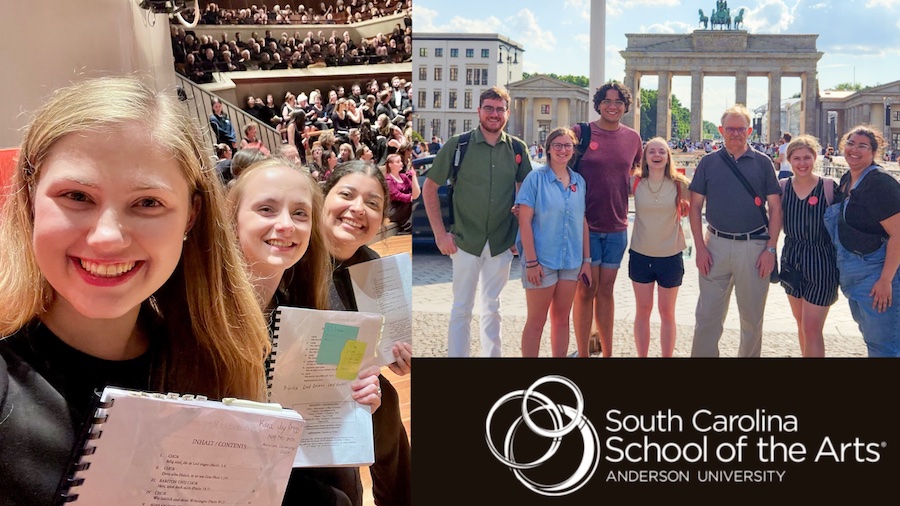Six Anderson University students combined with choirs from across Europe and the United States as part of a mass international choir of 800 voices backed up by a full orchestra, performing in a concert June 25 at the Philharmonie Berlin, part of the Brahms Project of Choral Space.
They performed Brahms’ A German Requiem on a unique stage that is literally surrounded by audience seating. In this concert, however, the performers took up not only the stage, but also half of the audience space. Dr. Richard Williamson, Professor of Music, Theory and Composition and Director of Choral Activities, was joined by students Luke Smith, Emily Jones, Kara Bragg, Carlie Frederiksen, Rebekah Menoni and Joey Carlisle.
Each student went through an audition process, followed by individual practice using resources provided by Choral Space and Dr. Williamson.
Of the audition process itself, Dr. Williamson said, “I gave them printed music for one of the most challenging passages in the piece and a rehearsal recording. And I said, ‘you’re on your own.’ They didn’t get the job unless they could make the recording of the hardest part of the piece and be pretty successful.”
Upon arriving in Germany, everything was a whirlwind. In all there were six days devoted to travel and four of them actually spent in Berlin. According to Dr. Williamson, they landed in Berlin around Noon and the first rehearsal was at 4 p.m.
“It was a fast-paced trip and we hit the ground running,” said Kara Joy Bragg, a rising senior from Atlanta majoring in Music Education. “It was a lot of people’s first time out of the country, so it was just really exciting getting to experience that with your friends and your classmates and see what they thought about it.”
“It was taxing, but it was a lot of fun,” said Joey Carlisle, a rising senior from Summerton, South Carolina majoring in Choral Music Education. “We dove into rehearsal singing the piece. We barely got there on time for the rehearsal to start and then were so exhausted from flying and all of a sudden you hear 800 plus voices singing German, Brahms Requiem, and it was incredible. At just the first rehearsal I was blown away by that sound. That’s the biggest ensemble I’ve ever sung in.”
“The first rehearsals were at the Haus des Rundfunks, which literally means ‘the radio house.’ It’s a concert and broadcast venue designed for an orchestra and professional choir. We’re sitting in the audience for that and had rehearsals with two pianists to begin with,” Dr. Williamson said, adding that there was a native German speaker present to demonstrate correct pronunciation. “There were people there from English speaking countries, people from Greece, people from Italy, people from Finland, he had a German person who was one of his students, the conductor was English, but one of his students was there to actually model the German for us and it is a little different than what you might learn in basic classes.”
“We’re singing in German, but it’s all biblical text, the Brahms Requiem is, and so I just kept thinking like, ‘oh my gosh, this is what heaven is going to be like,’ like we’re all here from different parts of the world, but we’re all singing in the same language,” Bragg said. “It gave me chills once we all just started singing, and once we got the orchestra especially it was just goosebumps.”
“I’m continually blown away by the skills of our peers and also how our professors are invested in us. It was so rewarding to be able to make this music at this caliber, with my friends and with the support of my professors, and I’m very grateful for that,” Carlisle said. “I’m so grateful to Dr. Williamson for making this opportunity happen and giving us this experience that we’ll be able to remember for the rest of our lives.”
The group also saw the Brandenburg Gate and toured Charlottenburg Palace, as well as Museum Island.
The South Carolina School of the Arts
The South Carolina School of the Arts at Anderson University offers Bachelor of Arts, Bachelor of Fine Arts, Bachelor of Music, Bachelor of Music Education and Master of Music Education degrees with majors and concentrations in graphic design, painting and drawing, ceramics, art education, musical theatre, acting, theatrical design, theatre, acting and directing, dance, worship leadership, music education, and vocal, keyboard and instrumental performance. Visit them online here.

